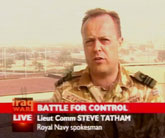 Amy Goodman of Democracy Now! conducted a brilliant interview with British Lieutenant Commander Steve Tatham on his experience as head of the British Royal Navy's Media Operations in the Northern Arabian Gulf.
Amy Goodman of Democracy Now! conducted a brilliant interview with British Lieutenant Commander Steve Tatham on his experience as head of the British Royal Navy's Media Operations in the Northern Arabian Gulf.Lt. Commander Tatham was responsible for coordinating war correspondents embedded with British troops, as well as for fielding media inquiries before, during and following the Iraq invasion (between November 2002 and May 2003). He and Amy Goodman discussed his new book, "Losing Arab Hearts and Minds: The Coalition, Al Jazeera and Muslim Public Opinion", which is now available in hardback via Amazon in the UK.
From the interview [emphasis mine]:
AMY GOODMAN: ... you describe how the British military spokespeople -- you all -- dealt differently with the British press corps each day, and how little information the U.S. military was giving out at CentCom.STEVE TATHAM: Yes, and that was a source of frustration to the U.S. media, as well. I suppose that a result of the relationship that we've had -- we have perhaps one of the most intrusive and non-deferential media in the world, and it really is engaging with the media at a rough, tough boxing match at times. And what that's enabled us to do is build up a significant rapport with the key people from the media and, importantly, trust, and we understand the parameters in which they work, and they understand the parameters in which we exist. And so, we had that rather mature relationship, where we could say to elements of the British media, "Come on, I'm gonna give you a brief. This is off the record. You're not to broadcast this until such and such a time," and we knew, because of the long-term relationship that existed, that that trust would be honored. I'm not entirely sure that the U.S. military had quite the same relationship with, certainly the American media, and the international media. It was a much more formalized briefing style. They obviously relied on, obviously, visual imagery of events that were happening and didn't tend to develop into little closed huddles of discussions and debates, and I think that characterized the difference between the two.
It goes without saying that the Bush administration would have done well to have followed the British lesson -- honest and direct communication with the press builds trust. It was a model the American military had learned long before Bush took office. I suppose the military "unlearned" that model when the Administration decided, early on, that the war could not be sold to the American people if all the facts were on the table.
(Image from Transnational Broadcasting Studies)
1 comment:
I read the book when I across in the UK - its excellent and I recommend it to anyone with an interest in the war on in Al-Jazeera
Post a Comment